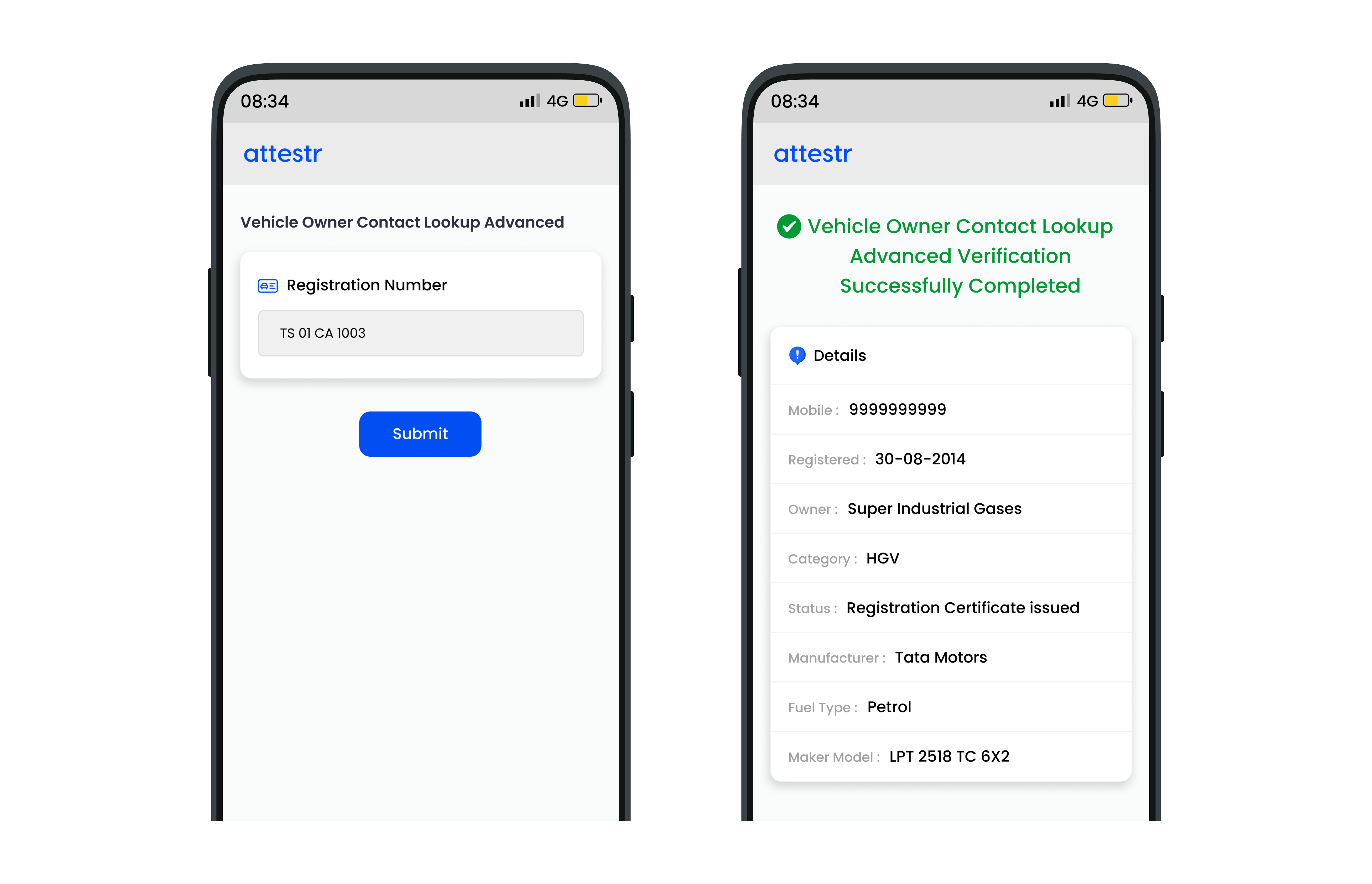Vehicle Owner Mobile Lookup API
API FOR FETCHING OWNER CONTACT FOR A GIVEN INDIAN VEHICLE REGISTRATION CERTIFICATE (RC) NUMBER
Description
Vehicle Owner Contact Information Lookup Service allows you to retrieve the owner’s contact details using just the vehicle number. By entering the vehicle number, you can access accurate and up-to-date contact information, enabling efficient verification and communication. This service is ideal for legal, administrative, insurance and customer service purposes, offering a secure and streamlined way to obtain complete ownership details while ensuring privacy and compliance with data protection regulations.

API Details
Request
| Type | URL | Current Version |
|---|---|---|
| POST | https://api.attestr.com/api/{version}/public/checkx/rc-mobile | v2 |
Request Body Parameters
| Type | Name | Description | Optional (default) | Min Version | Max Version |
|---|---|---|---|---|---|
| String | reg | Input vehicle RC number to be verified. | Required | v2 |
### Request Header Parameters
| Type | Name | Value / Description | Optional | Min Version | Max Version |
|---|---|---|---|---|---|
| String | Content-Type | application/json | Required | v2 | |
| String | Authorization | Basic {authToken} | Required | v2 |
If you do not have the authentication token, please refer to Register App to generate one.
Sample Request Payload
{ "reg": "AP09CU7296"}Response
HTTP Status 200
| Key | Description | Type | Min Version | Max Version |
|---|---|---|---|---|
| valid | Flag indicating if the details are fetched successfully | Boolean | v2 | |
| status | Status of the outcome. Status can have 4 possible values. VALID_FOUND - If the mobile number is found NOT_FOUND - Details not available for the provided vehicle number | String | v2 | |
| contact | Mobile number of the owner if available | String | v2 | - |
Sample response for valid mobile number found case
{ "valid": true, "status": "VALID_FOUND", "contact": "8890909090}Sample response for the not found case
{ "valid": false, "status": "NOT_FOUND", "contact": null}Error Response
| Parameter | Type | Description |
|---|---|---|
| code | Number | Unique error codes for different errors. Always available. |
| message | String | Error message describing the error. Always Available. |
| details | String | Detail error message. Available only for certain types of errors. |
| HTTP Status | Error Code | Error Message |
|---|---|---|
| 400 | 4001 | Malformed data or missing required parameter values |
| 400 | 4005 | Operation could not be performed due to low credits balance |
| 401 | 4016 | Invalid client authorization |
| 403 | 4031 | Unauthorized access |
| 403 | 4035 | Requested service is not provisioned for your account |
| 403 | 4039 | Client's IP address is not whitelisted |
| 403 | 4035 | Requested service is not provisioned for your account |
| 429 | 4291 | Maximum account rate limit exceeded |
| 429 | 4292 | Maximum API rate limit exceeded |
| 429 | 4293 | Maximum account daily limit exceeded |
| 429 | 4294 | Maximum API daily limit exceeded |
| 500 | 5001 | Request could not be processed |
Sample Error Response
{ "code": 4001, "message": "Malformed data or missing required parameter values"}